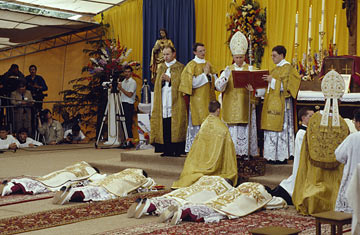
Monsignor Lefebvre ordains four schismatic bishops — Bernard Fellay, Alfonso Gallareta, Richard Williamson and Tissier de Malleray
When Pope Benedict XVI lifted the excommunication of four bishops from an ultra-conservative movement in January, even his admirers worried that he was taking the proverbial lid off Pandora's box. The group known as the Society of St. Pius X had, after all, operated a separate ministry since 1988, when its founder, the late Archbishop Marcel Lefebvre, ordained his own bishops in open defiance of Pope John Paul II. Two decades of schism were bound to feed both unorthodox ideas and an autonomous chain of authority.
The first big problem emerged immediately after Benedict's surprise gesture of rapprochement when it turned out that one of the four bishops brought back into the fold, British-born Richard Williamson, was a vocal Holocaust denier. That required weeks of Vatican damage control. But another clash is brewing that may seem less explosive to the outside world but is actually more problematic for long-term church relations. For the Society is now preparing to openly defy the Holy See again. The group has announced that on June 27, three new priests and three deacons will be ordained at its seminary in southern Germany, with plans for further ordinations at its headquarters in Switzerland and in Winona, Minn. Such unauthorized ordinations are indeed reminiscent of what led to the schism in the first place.
Lefebvre's successor, Monsignor Bernard Fellay, has defended the new ordinations, noting that his group and the Catholic Church as a whole need new priests. But Gerhard Müller, the bishop of Regensburg, the official Catholic diocese with oversight of the German ordinations, recently stated that without Vatican permission the new priests and the ordaining bishop could be excommunicated. The Vatican released a statement Wednesday that the ordinations "must be considered illegitimate," though no mention was made of excommunication. The brief note from the Holy See also referred to the Pope's letter to bishops in March that outlined how the Pius X followers are still largely operating outside of official church auspices and must now enter discussions with the Vatican's doctrinal office to confront outstanding differences.
Ultimately, religious schisms often boil down to the question of who's in charge. In this specific case, the Lefebvrites want to decide who becomes a priest of the Catholic Church, an authority that for centuries has rested solely in the hands of local bishops, who derive their authority from the Pope himself. One senior Vatican official says that the Pope's unilaterally reaching out to the Society, even with many outstanding issues unresolved, has emboldened rather than humbled the breakaway flock. "They thought all concessions had to come from Holy See," he says. "But they are [now] going to have to admit their own obedience to authority."
